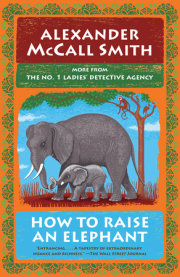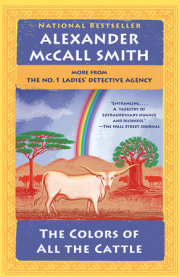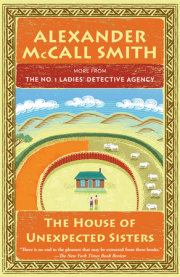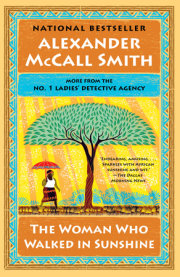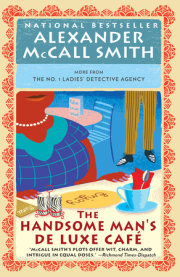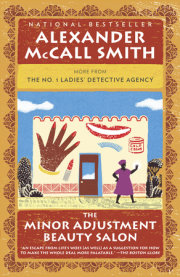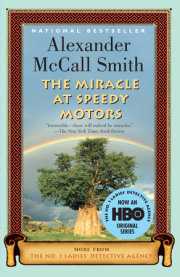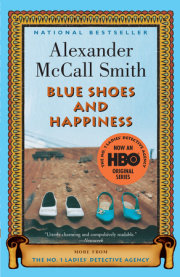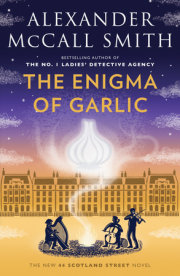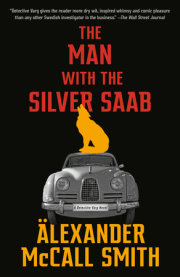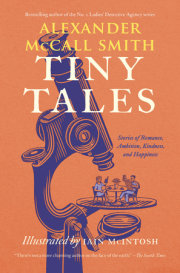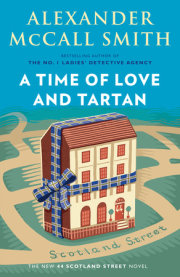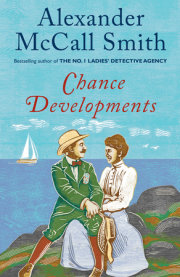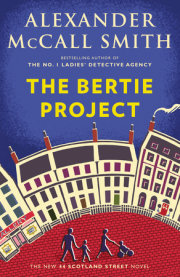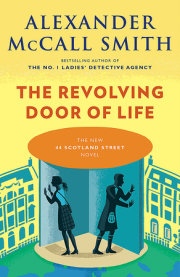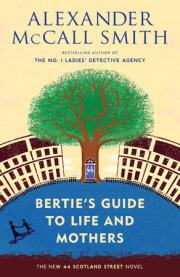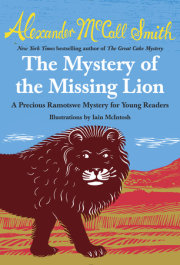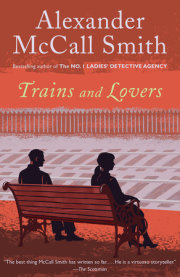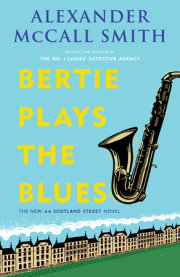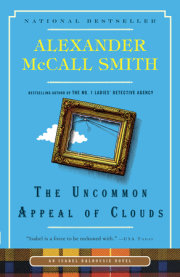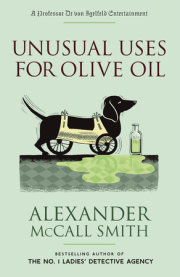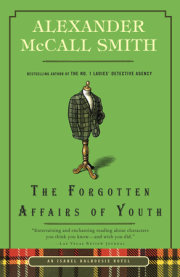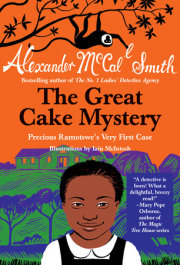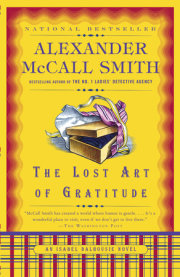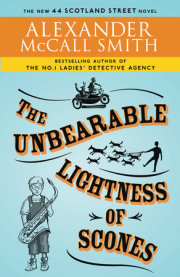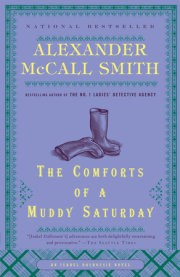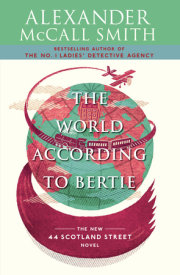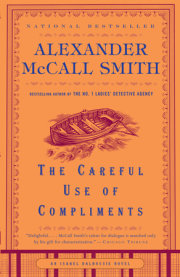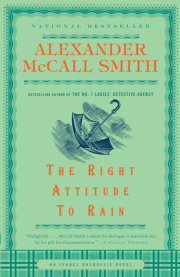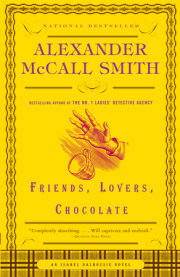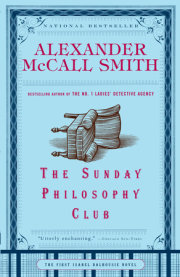Chapter One
YOU DO NOT CHANGE PEOPLE BY SHOUTING AT THEM
No car, thought Mr. J.L.B. Matekoni, that great mechanic, and good man. No car . . .
He paused. It was necessary, he felt, to order the mind when one was about to think something profound. And Mr. J.L.B. Matekoni was at that moment on the verge of an exceptionally important thought, even though its final shape had yet to reveal itself. How much easier it was for Mma Ramotswe—she put things so well, so succinctly, so profoundly, and appeared to do this with such little effort. It was very different if one was a mechanic, and therefore not used to telling people—in the nicest possible way, of course—how to run their lives. Then one had to think quite hard to find just the right words that would make people sit up and say, “But that is very true, Rra!” Or, especially if you were Mma Ramotswe, “But surely that is well known!”
He had very few criticisms to make of Precious Ramotswe, his wife and founder of the No. 1 Ladies’ Detective Agency, but if one were to make a list of her faults—which would be a minuscule document, barely visible, indeed, to the naked eye—one would perhaps have to include a tendency (only a slight tendency, of course) to claim that things that she happened to believe were well known. This phrase gave these beliefs a sort of unassailable authority, the status that went with facts that all right-thinking people would readily acknowledge—such as the fact that the sun rose in the east, over the undulating canopy of acacia that stretched along Botswana’s border, over the waters of the great Limpopo River itself that now, at the height of the rainy season, flowed deep and fast towards the ocean half a continent away. Or the fact that Seretse Khama had been the first President of Botswana; or even the truism that Botswana was one of the finest and most peaceful countries in the world. All of these facts were indeed both incontestable and well known; whereas Mma Ramotswe’s pronouncements, to which she attributed the special status of being well known, were often, rather, statements of opinion. There was a difference, thought Mr. J.L.B. Matekoni, but it was not one he was planning to point out; there were some things, after all, that it was not
helpful for a husband to say to his wife and that, he thought, was probably one of them.
Now, his thoughts having been properly marshalled, the right words came to him in a neat, economical expression:
No car is entirely perfect. That was what he wanted to say, and these words were all that was needed to say it. So he said it once more.
No car is entirely perfect.In his experience, which was considerable—as the proprietor of Tlokweng Road Speedy Motors and attending physician, therefore, to a whole fleet of middle-ranking cars—every vehicle had its bad points, its foibles, its rattles, its complaints; and this, he thought, was the language of machinery, those idiosyncratic engine sounds by which a car would strive to communicate with those with ears to listen, usually mechanics. Every car had its good points too: a comfortable driving seat, perhaps, moulded over the years to the shape of the car’s owner, or an engine that started the first time without hesitation or complaint, even on the coldest winter morning, when the air above Botswana was dry and crisp and sharp in the lungs. Each car, then, was an individual, and if only he could get his apprentices to grasp that fact, their work might be a little bit more reliable and less prone to require redoing by him.
Push, shove, twist: these were no mantras for a good mechanic.
Listen, coax, soothe: that should be the motto inscribed above the entrance to every garage; that, or the words which he had once seen printed on the advertisement for a garage in Francistown:
Your car is ours.That slogan, persuasive though it might have sounded, had given him pause. It was a little ambiguous, he decided: on the one hand, it might be taken to suggest that the garage was in the business of taking people’s cars away from them—an unfortunate choice of words if read that way. On the other, it could mean that the garage staff treated clients’ cars with the same care that they treated their own. That, he thought, is what they meant, and it would have been preferable if they had said it.
It is always better to say what you mean—it was his wife, Mma Ramotswe, who said that, and he had always assumed that she meant it.
No, he mused: there is no such thing as a perfect car, and if every car had its good and bad points, it was the same with people. Just as every person had his or her little ways—habits that niggled or irritated others, annoying mannerisms, vices and failings, moments of selfishness—so too did they have their good points: a winning smile, an infectious sense of humour, the ability to cook a favourite dish just the way you wanted it.
That was the way the world was; it was composed of a few almost perfect people (ourselves); then there were a good many people who generally did their best but were not all that perfect (our friends and colleagues); and finally, there were a few rather nasty ones (our enemies and opponents). Most people fell into that middle group—those who did their best—and the last group was, thankfully, very small and not much in evidence in places like Botswana, where he was fortunate enough to live.
These reflections came to Mr. J.L.B. Matekoni while he was driving his tow-truck down the Lobatse Road. He was on what Mma Ramotswe described as one of his errands of mercy. In this case he was setting out to rescue the car of one Mma Constance Mateleke, a senior and highly regarded midwife and, as it happened, a long-standing friend of Mma Ramotswe. She had called him from the roadside. “Quite dead,” said Mma Mateleke through the faint, crackling line of her mobile phone. “Stopped. Plenty of petrol. Just stopped like that, Mr. Matekoni. Dead.”
Mr. J.L.B. Matekoni smiled to himself. “No car dies for ever,” he consoled her. “When a car
seems to die, it is sometimes just sleeping. Like Lazarus, you know.” He was not quite sure of the analogy. As a boy he had heard the story of Lazarus at Sunday School in Molepolole, but his recollection was now hazy. It was many years ago, and the stories of that time, the real, the made-up, the long-winded tales of the old people—all of these had a tendency to get mixed up and become one. There were seven lean cows in somebody’s dream, or was it five lean cows and seven fat ones?
“So you are calling yourself Jesus Christ now, are you, Mr. Matekoni? No more Tlokweng Road Speedy Motors, is it? Jesus Christ Motors now?” retorted Mma Mateleke. “You say that you can raise cars from the dead. Is that what you’re saying?”
Mr. J.L.B. Matekoni chuckled. “Certainly not. No, I am just a mechanic, but I know how to wake cars up. That is not a special thing. Any mechanic can wake a car.” Not apprentices, though, he thought.
“We’ll see,” she said. “I have great faith in you, Mr. Matekoni, but this car seems very sick now. And time is running away. Perhaps we should stop talking on the phone and you should be getting into your truck to come and help me.”
So it was that he came to be travelling down the Lobatse Road, on a pleasantly fresh morning, allowing his thoughts to wander on the broad subject of perfection and flaws. On either side of the road the country rolled out in a grey-green carpet of thorn bush, stretching off into the distance, to where the rocky outcrops of the hills marked the end of the land and the beginning of the sky. The rains had brought thick new grass sprouting up between the trees; this was good, as the cattle would soon become fat on the abundant sweet forage it provided. And it was good for Botswana too, as fat cattle meant fat people—not too fat, of course, but well-fed and prosperous-looking; people who were happy to be who they were and where they were.
Yes, thought Mr. J.L.B. Matekoni, even if no country was absolutely perfect, Botswana, surely, came as close as one could get. He closed his eyes in contentment, and then quickly remembered that he was driving, and opened them again. A car behind him—not a car that he recognised—had driven to within a few feet of the rear of his tow-truck, and was aggressively looking for an opportunity to pass. The problem, though, was that the Lobatse Road was busy with traffic coming the other way, and there was a vehicle in front of Mr. J.L.B. Matekoni that was in no hurry to get anywhere; it was a driver like Mma Potokwane, he imagined, who ambled along and frequently knocked the gear-stick out of gear as she waved her hand to emphasise some point she was making to a passenger. Yet Mma Potokwane, and this slow driver ahead of him, he reminded himself, had a right to take things gently if they wished. Lobatse would not go away, and whether one reached it at eleven in the morning or half past eleven would surely matter very little.
He looked in his rear-view mirror. He could not make out the face of the driver, who was sitting well back in his seat, and he could not therefore engage in eye contact with him. He should calm down, thought Mr. J.L.B. Matekoni, rather than . . . His line of thought was interrupted by the sudden swerving of the other vehicle as it pulled over sharply to the left. Mr. J.L.B. Matekoni, well versed as he was in the ways of every sort of driver, gripped his steering wheel hard and muttered under his breath. What was being attempted was that most dangerous of manoeuvres—overtaking on the wrong side.
He steered a steady course, carefully applying his brakes so as to allow the other driver ample opportunity to effect his passing as quickly as possible. Not that he deserved the consideration, of course, but Mr. J.L.B. Matekoni knew that when another driver did something dangerous it was best to allow him to finish what he was doing and get out of the way.
In a cloud of dust and gravel chips thrown up off the unpaved verge of the road, the impatient car shot past, before swerving again to get back onto the tarmac. Mr. J.L.B. Matekoni felt the urge to lean on his horn and flash his lights in anger, but he did neither of these things. The other driver knew that what he had done was wrong; there was no need to engage in an abusive exchange which would lead nowhere, and would certainly not change that driver’s ways. “You do not change people by shouting at them,” Mma Ramotswe had once observed. And she was right: sounding one’s horn, shouting—these were much the same things, and achieved equally little.
And then an extraordinary thing happened. The impatient driver, his illegal manoeuvre over, and now clear of the tow-truck, looked in his mirror and gave a scrupulously polite thank-you wave to Mr. J.L.B. Matekoni. And Mr. J.L.B. Matekoni, taken by surprise, responded with an equally polite wave of acknowledgement, as one would reply to any roadside courtesy or show of good driving manners. That was the curious thing about Botswana; even when people were rude—and some degree of human rudeness was inevitable—they were rude in a fairly polite way.
Copyright © 2010 by Alexander Mccall Smith. All rights reserved. No part of this excerpt may be reproduced or reprinted without permission in writing from the publisher.









